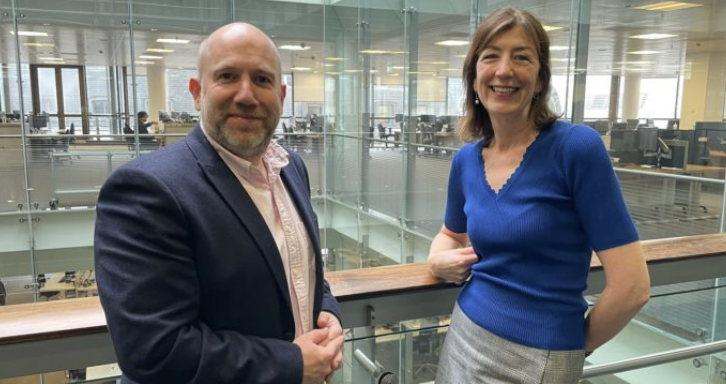Asda appoints CBRE to assist with convenience store expansion programme
Global real estate advisor, CBRE, has been appointed to assist Asda on its extensive nationwide store expansion programme.
Leeds-based Asda is one of the UK’s leading supermarkets, with 633 stores in the UK. The company was founded in 1949 and is owned by the Issa brothers and TDR capital, following the acquisition in October 2020.
Last October, the retailer launched a new ‘Asda Express’ convenience brand. The first two Asda Express stores opened before Christmas and Asda is planning to open a further 300 stores by the end of 2026.
Adrian Hanley, director, UK Retail at CBRE, said: “Shopping patterns have evolved in recent years and whilst some shoppers will continue to grocery shop solely online, there will always be incredibly strong demand for physical grocery stores.
“Enhancing its store offering to include convenience stores on a national scale will further solidify Asda’s position as a leading supermarket. CBRE’s market-leading retail team and extensive network across the UK makes us perfectly placed to assist Asda in fulfilling the next step of their store strategy.”
New Commission aims to improve skills supply in finance and professional services
A new commission has been set up to improve the supply of skills for the financial and professional services industry in Yorkshire and the Humber.
Made up of senior leaders in financial and related professional services, education and local government, the Yorkshire and the Humber Financial and Professional Services Skills Commission aims to create a shared understanding of the skills the industry needs in the region and to develop a plan to close the gap.
Over the next six months it will conduct evidence sessions with relevant experts, engage widely with business leaders and others, and conduct focus groups with the public to inform its work.
Financial and professional services play a critical role in Yorkshire and the Humber, employing around 150,000 people in the region, making up around 9% of its economy.
This includes centuries old building societies, cutting edge fintech firms and major offices for some of the UK’s biggest finance, legal and consulting firms.
Recent years have also seen government institutions focused on finance, such as the National Infrastructure Bank, the Centre for Finance, Innovation and Technology, and the northern hub of the Bank of England become established in the region.
The industry is set to grow strongly in future but faces challenges securing the diverse range of skills it needs to do so, including as a result of changing ways of working, competition from other parts of the country to keep talent in the region, and competition from other sectors.
The Commission has been convened by Yorkshire Building Society and will be chaired by John Heaps, the chair of Yorkshire Building Society. It is being delivered with the support of industry bodies TheCityUK, the City of London Corporation, and The Financial Services Skills Commission, with public policy specialists Public First leading the research. It aims to publish a report setting out its findings in the autumn.
Commenting on the launch of the Commission, Mr Heaps said: “Financial and professional services play a critical role in the success of Yorkshire and the Humber – employing around 150,000 people in the region and making up around 9% of its economy – but the sector faces significant challenges in securing the skills and talent needed if it is to grow as strongly as predicted.
“The work of the Commission therefore is vital in determining the priorities we need to improve the skills of the region’s workforce for the future and I’m confident, with cross-industry collaboration, it will result in meaningful recommendations that will enable a talent pipeline for financial and professional services that will benefit the region’s economy.”
Leeds university spin-out secures Northern Gritstone investment
Northern Gritstone, the investment business focused on university spin-outs and technology-enabled businesses in the North of England, has invested in LC AuxeTec, a deeptech company developing auxetic materials from liquid crystal elastomers, as part of a targeted £2 million seed investment funding round.
Auxeticity – the property of a material to become thicker rather than thinner when stretched – is a unique phenomenon. In nature, this property can be seen in places like the Achilles tendon and cat skin. Auxeticity is attractive as it can give materials an advantage when it comes to absorbing shock, as well as resisting fractures and tears. That makes these materials promising in applications that require durability and robustness, such as electronic screens and glass for buildings and vehicles.
LC AuxeTec is the first spin-out from the University of Leeds to receive investment from Northern Gritstone as part of a seed investment round. The company was conceived by Professor Helen Gleeson OBE, Cavendish Professor, and former Head of the School of Physics at the University. In her academic career, which spans more than 30 years, Helen has led a wide range of research projects and won the Times Higher Education Award for Outstanding Research Supervisor of the Year in 2018.
In exploring the semi-soft elasticity of liquid crystal elastomers, Helen and her team made a serendipitous discovery: the world’s first synthetic material that is auxetic at the molecular level. The unintuitive properties of LC AuxeTec’s materials mean they expand when under pressure, giving them superior impact and delamination resistance.
The patent which covers these materials is exclusively licensed to the company. Prof Gleeson and her team will continue to make improvements to the auxetic materials at the University of Leeds and LC AuxeTec will have access to these developments and first rights to in-license any new IP that emerges in this area.
The company will use the funding to build out its team and appoint its first full-time employees, including incoming CEO Robert Gunn and Senior Engineer Matt Reynolds, and move into dedicated offices in the Nexus building on the University of Leeds campus.
Robert has for more than 15 years’ experience in leading science and technology-based start-ups. He is joining LC AuxeTec from his position as CEO of consultancy business Enceladus Ventures, where he was responsible for accelerating the performance of early-stage businesses through providing strategic leadership and advice.
Robert’s rich experience will be invaluable to LC AuxeTec as the company looks to scale up the development of its auxetic material so that it can be tested for specific commercial use cases. The company is already working with industry partners to create demonstration devices for selected markets, initially targeting polymers for wind turbines and laminated safety glass for automotive applications.
Northern Gritstone was advised by Freeths, led by Dahren Naidoo (Partner).
Duncan Johnson, CEO of Northern Gritstone, said: “In pushing the boundaries of their research to develop a unique auxetic material, Helen and her team have showcased Northern universities’ ability to drive innovation and create world-leading businesses in the region.
“This investment will help ensure LC AuxeTec’s technology reaches its full potential and maximise opportunities for commercial use. We look forward to working with Rob and the University of Leeds as they guide the company’s expansion and develop proof points that their industry partners can roll out across their products.”
Robert Gunn, incoming CEO of LC AuxeTec, said: “After working with many early-stage businesses in my previous role, I cannot wait to get onboard at LC AuxeTec and start work on developing this extraordinary material for real world uses.
“Northern Gritstone’s investment will be essential to helping us to achieve this, allowing us to take the world-class research produced by Helen and the University of Leeds team and commercialise it for industry. We are just beginning to grasp the full possibilities of this material and I am optimistic about the results we can deliver in the years ahead.”
Professor Helen Gleeson, Founder of LC Auxetec and Cavendish Professor of Physics at the University of Leeds, said: “When we discovered that our materials were auxetic at the molecular level, we began to realise the opportunities that they could hold across a number of different industries as they can be stretched further than other materials already available.
“As we continue to test the properties of our material and expand our understanding of what it is achievable, Northern Gritstone’s funding will enable Robert and his new team to start making these potential use cases a reality. We will continue to work closely together to share knowledge and ensure the success of LC AuxeTec going forwards.”
National Measurement Laboratory launches Leeds lab
The National Measurement Laboratory (NML) at LGC has chosen the University of Leeds’ innovation community, Nexus for its new Northern Cell Metrology Hub, a centre of innovation for clinical diagnostics and medical technology.
The first step in a partnership between the University of Leeds and the NML, the laboratory was launched on Friday 31 March 2023 at a special event.
Professor Julian Braybrook, UK Government Chemist and Director of Science & Partnerships of National Laboratories, LGC, said: “Cells provide the structure and function for all living things. However, they are particularly complex to characterize robustly.
“Whilst the partnership coming together through this Hub represents significant progress in our collaboration, I most look forward to our working together to develop new internationally leading approaches that support the greater understanding of biological measurement.”
The hub, which represents a new centre for the NML’s existing cell metrology capabilities in the UK, will support health and life science industries achieve safe, reliable and productive solutions through innovative technology and will focus on the standardisation of cell measurements, using flow cytometry and bio-imaging techniques, for analysis of single cells.
Professor Nick Plant, Deputy Vice-Chancellor for Research and Innovation at the University of Leeds, said: “This partnership is the start of an exciting long-term collaboration between the University of Leeds, Nexus and the NML, further developing our reputation as a national hub for medical technology innovation.
“We will be working closely with the NML, sharing vital knowledge and equipment through our Cellular Biology specialists at the University’s Astbury Centre.”
Dr Martin Stow, Chair and Director at Nexus, added: “This is yet another huge accolade for Leeds City Region as a centre of excellence and innovation in healthcare and life sciences.
“As part of the Leeds Innovation Arc – the innovation neighbourhoods formed around our universities and the proposed new adult and children’s hospitals in the city – the new hub confirms Leeds’ status as a welcoming and thriving location for businesses and organisations which have a positive impact on people’s health and society’s wellbeing.”
In addition to the University as partner, the new lab has local support from the Yorkshire & Humberside Academic Health Science Network (AHSN) and Leeds NHS Trust.
Business optimism grows in West and North Yorkshire
New research from West & North Yorkshire Chamber of Commerce shows that confidence among businesses in the region has rebounded significantly, with the expectation of significant improvements in turnover and profitability.
Data in the Chamber’s latest Quarterly Economic Survey for the first quarter of 2023 shows that the amount of companies expecting to grow their profits is now at a comparable level to that seen at the start of 2022, before the war in Ukraine.
Optimism among the manufacturing sector in particular is very strong, with the level of firms in the industry expecting to grow their profits during the coming months now higher than levels seen prior to the pandemic, having nearly doubled from the preceding quarter.
There was also positive news on employment, with both service and particularly manufacturers having taken on new staff since the start of the year. For the manufacturing sector, its employment figures are at a level not seen since the start of 2017.
However, there was more negative news on investment and some areas of sales, with inflation pushing these areas downwards from the previous quarter as overheads continue to soar.
While service sector firms saw a healthy 18 per cent rise in overseas sales, domestic activity was largely static or, in the case of manufacturers, down. The research was conducting prior to last month’s rise in inflation and subsequent interest rate hike. Order books do not look terribly strong across the board but are marginally higher than seen before the Mini Budget in September. Both service and manufacturing firms will now be looking anxiously to the next three months to see if improving economic forecasts begin to translate into improving sales.
One area business is not expecting to see an improvement in is prices. Just four per cent of firms expect costs to decrease in the coming months and the best most companies are hoping for is simply for prices to remain as they are.
Elsewhere, cashflow remains a mixed bag with manufacturers having rebounded from two quarters of decline while service sector firms reporting a marginal decrease, albeit not on the same level as seen last autumn.
Bruce Wallace Associates join Shakespeare Martineau
Company secretarial business Bruce Wallace Associates is joining East Midlands full-service law firm Shakespeare Martineau as part of a shared growth strategy.
The union will see Bruce Wallace Associates’ team of five, including its directors Susan Wallace and Martha Bruce, take on the Shakespeare Martineau brand – bringing the team to more than 13.
Bruce and Wallace are both Fellows of the Chartered Governance Institute and are regarded as experts in their field. They provide complex advice and support to AIM and main market-listed companies, as well as FCA-regulated and groups of companies. They also regularly contribute to a number of company secretarial and governance technical publications.
Also moving to Shakespeare Martineau – which has hubs in Nottingham, Leicester and Lincoln – are Chloe Higgins and Susan Tudor-Coulson, both associates of the CGI, and Hollie Watkins, who is responsible for the compliance and statutory filing obligations for clients.
Susan Wallace said: “Martha and I believe this is an excellent move for us and our clients, who will benefit from continuity of service and the 1,200-strong team of experts available across Shakespeare Martineau and the Ampa group. We are keen to grow our team and client base, and the infrastructure Shakespeare Martineau offers will enable us to do just that.
“We were also attracted to Shakespeare Martineau’s empowered working principles – focussed on delivery and service instead of strict working hours, which is hugely important to our team. Martha and I set up Bruce Wallace Associates in 2012 from our homes and we have continued to work remotely and build a team of professional staff to support us.”
Ben Harber, head of CoSec at Shakespeare Martineau, said: “We are thrilled to have Bruce Wallace Associates joining our team; not only do they have an impeccable reputation, excellent networks and share multiple service synergies with us, but they also share our values and ethos to provide the highest standard of company secretarial and corporate governance advisory services to their clients.”
The CoSec team at Shakespeare Martineau provides specialist corporate governance advice and company secretarial services to public companies listed on AIM, AQSE and the main market as well as several large private groups. In financial year 21/22, the team achieved 25% organic growth, with a similar trajectory for this financial year and ambitious targets for 23/24.
Ringrose Law names new Managing Director
Ryan Clarke has been named as the new MD at Rigrose Law, having worked with the Firm as Finance Director since 2019. He has played a key role in the Operations and Management of Ringrose Law during this period and has already made significant changes to the running of the firm.
Ryan has nearly fifteen years of experience in senior financial and management roles and has the perfect mix of commercial, strategic and client-focused experience to bring to the role.
Senior Director John Knight said: “Ryan has always been an integral part of the management team and a key influencer in delivering change within the organisation. The blend of his personality and character makes us a compatible and formidable team.
He has a wealth of expertise and we will support him with this new role as we continue to grow and excel at delivering legal services across Lincolnshire and the East Midlands.”
Mr Clarke said: “I am really looking forward to the challenge of leading Ringrose as it has lots of potential to make a bigger impact locally. The Firm does some fantastic work in the region, and we have a strong platform in which to expand that offering and build for the future. We have great staff here and it’s an exciting time to be part of the business as we look to grow.“
Ryan will continue to work alongside the existing Directors of the Firm including John Knight, David Heath, Nerina Farmer, Sarah Jackson, and Richard Teare.
American steel giant buys rolls from Sheffield company
North America’s largest steelmaker Nucor has ordered ultra-large steel rolls from Sheffield Forgemasters for its brand-new plate rolling mill.
Forgemasters will deliver three rolls weighing 147 tonnes each to Nucor’s Brandenburg Mill near Louisville, Kentucky, one of the world’s most advanced steel plate mills with the ability to produce 1.2 million tons annually.
The multi-million-dollar order is seen as a valuable win for the UK engineering specialist, which has a long history of supplying large plate mill rolls to global customers and the rolls will be integral to the Brandenburg Mill’s capabilities.
Dan Millington, Technical Sales Manager (Steel Processing), said: “This is a significant contract for Sheffield Forgemasters and marks the first time that we have made large plate mill rolls for Nucor.
“Manufacturing rolls of this size is a highly technical process, requiring multiple forging operations through our 10,000-tonne press, controlled heat treatment to meet the customer requirement, as well as rough and finish machining. We are the only UK company with the capability to produce rolls of this size.
“Our efforts to secure work in new rolls markets have been successful to date and we expect to announce further rolls contracts in due course.”
Sheffield Forgemasters will first ship the Nucor components to Antwerp, from where they will cross the Atlantic to Baltimore before being taken by rail to Kentucky.
Located along the Ohio River near Louisville, the Brandenburg mill will produce cut-to-length, coiled, heat-treated, and discrete steel plate ranging from 60 to 168 inches wide, and in gauges from 3/16 of an inch to 14 inches.
Nucor Steel Brandenburg will be among only a few mills globally – and the only one in the States – capable of manufacturing at scale the heavy gauge plate used in monopile foundations for offshore wind towers.
British Steel commits to saving 250 cokemakers’ jobs
British Steel has committed to offer alternative roles to around 250 colleagues affected by the closure of its Scunthorpe coke ovens.
The company will close the coke ovens as part of its drive to overcome global economic challenges and build a green and sustainable future.
Last year the company saw its bills for energy and carbon increase by £190m and it said decisive action is required because of the unprecedented rise in operating costs, surging inflation and the need to improve environmental performance.
Following a full review of the business rationale behind the coke ovens proposal, and as a result of there being no compulsory redundancies among coke ovens employees, the trade unions have confirmed they will not object to the proposed closure and that the formal consultation process on this matter is now complete.
A British Steel spokesperson said: “In the coming months we will press ahead with the closure of the coke ovens and we are pleased to say all employees affected by this decision will be offered alternative roles in the business. We appreciate this has been a difficult time for everyone involved and I’d like to thank our people and the trade unions for their professionalism throughout the consultation process.”
The company’s coke ovens at Scunthorpe are reaching the end of their operational life and their closure will bring environmental benefits including reductions in emissions to air and water, says the company.
Hull Old Town building to benefit from Government grant
A well-known city centre building will be restored and reopened thanks to a Government Levelling Up Grant, awarded by Hull City Council.
A Decision Record confirms that the ground floor of 94 Alfred Gelder Street, known locally as the most recent location of the Kardomah arts venue and cafe, will benefit from the refurbishment of the two commercial units.
A grant of £201,000 will be matched by applicant Krish Ventures GBR Limited, and used to create a flexible open co-working space and a coffee counter and commercial kitchen.
Funding will include the installation of new flooring, sound insulation, toilets, heating and air conditioning, as well as furniture and fittings.
The project will create six full-time jobs.
Garry Taylor, assistant director for major projects, culture & place, said: “94 Alfred Gelder Street is a prominent building in the city centre and to have the space open to the public again is great news.
“The Levelling Up Fund continues to provide opportunities across the city centre to bring disused properties back into use. This is another excellent example of that.”












